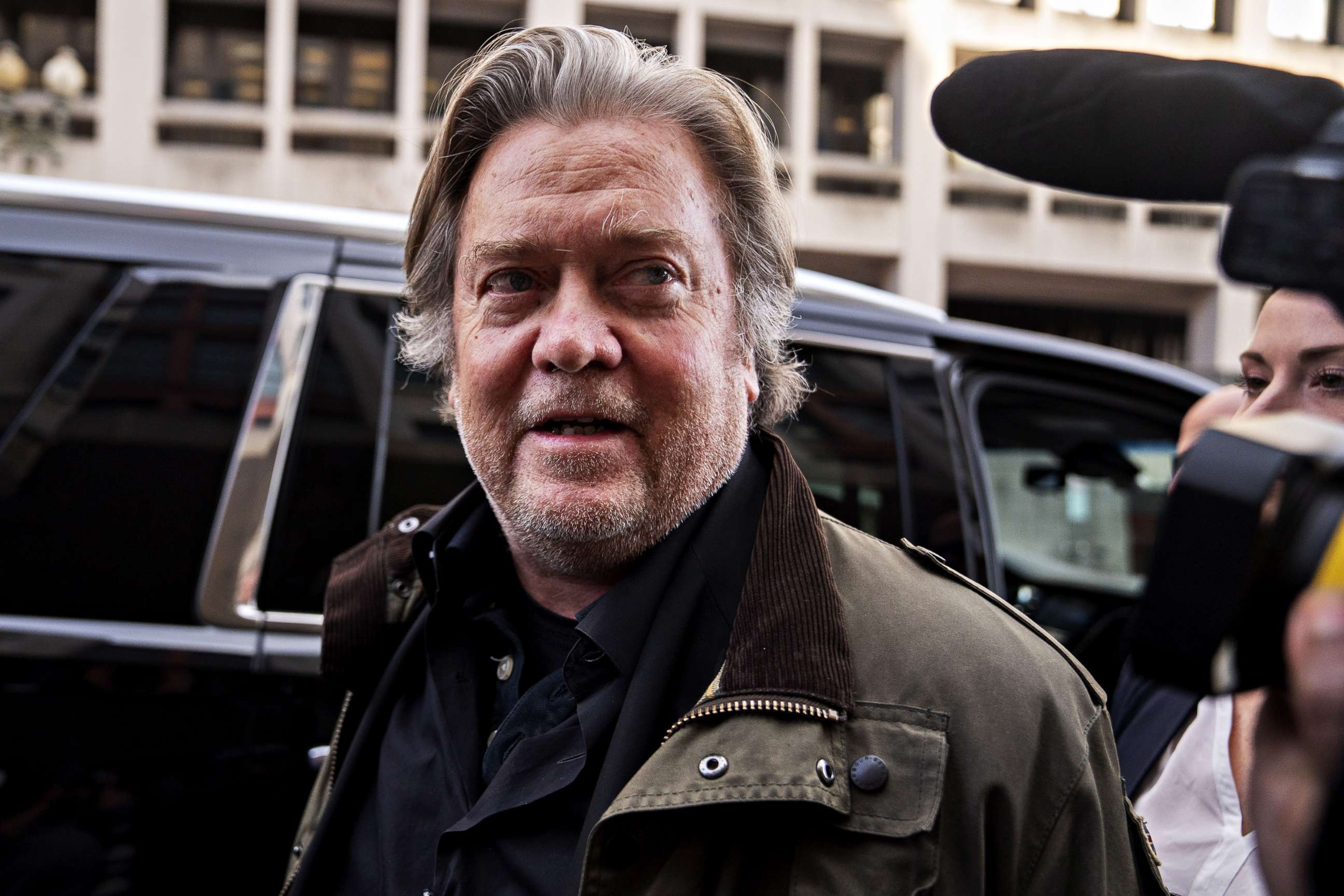Jan. 6 committee to 'swiftly consider' criminal contempt for Steve Bannon, others who ignore subpoenas
Bannon rebuffed the committee, citing Trump's claim of executive privilege.
The House select committee investigating the Jan. 6 Capitol riot will "swiftly consider" holding one-time Trump White House adviser Steve Bannon, and potentially others, in contempt of Congress for ignoring committee subpoenas, committee chairman Bennie Thompson vice-chair Liz Cheney said Friday.
The move came after Bannon formally advised the committee that he would be unable to comply with their requests, citing former President Donald Trump's intention to invoke executive privilege. In a letter obtained by ABC News, Bannon's lawyers said that until the matter is settled in court, they will not comply with the committee's subpoena.
The committee last month issued subpoenas to Bannon and other top Trump aides Mark Meadows, Kash Patel and Dan Scavino, as part of its probe into the Jan. 6 attack on the Capitol. An additional 11 subpoenas were issued last week to organizers of the pro-Trump rally that preceded the attack.
Meadows, a former White House chief of staff, and Patel, an ex-Pentagon official, are "engaging" with the committee, officials said. The committee had no update on the status of Scavino.
"While Mr. Meadows and Mr. Patel are, so far, engaging with the Select Committee, Mr. Bannon has indicated that he will try to hide behind vague references to privileges of the former President," Thompson and Cheney said in a joint statement. "The Select Committee fully expects all of these witnesses to comply with our demands for both documents and deposition testimony."
Sources confirm to ABC News that Trump's lawyer sent a letter to several of those subpoenaed informing them that the former president wants the subpoenas ignored and that he plans to claim executive privilege. In the letter, Trump suggested he would be willing to take the matter to court to block their cooperation.
However in an interview earlier this week with right-wing commentator John Solomon, Trump suggested that he would have no problem with his confidants participating in the probe.
"I'm mixed, because we did nothing wrong," Trump said. "So I'm sort of saying, 'Why are we hiring lawyers to do this?' I'd like to just have everybody go in and say what you have to say. We did nothing wrong."
Committee officials said that those who ignore the subpoenas could be held in contempt.

"Though the Select Committee welcomes good-faith engagement with witnesses seeking to cooperate with our investigation, we will not allow any witness to defy a lawful subpoena or attempt to run out the clock, and we will swiftly consider advancing a criminal contempt of Congress referral," the statement said.
Any motion of contempt would be passed along for the full House to consider. If passed, the matter would then be referred to the Justice Department for potential prosecution.
Democrats considered holding Bannon in contempt of a House Intelligence Committee subpoena in 2018, but ultimately declined to do so. The full House voted to hold former Attorney General Bill Barr and former Commerce Secretary Wilbur Ross in contempt of Congress in 2019 for ignoring House Oversight Committee subpoenas for records related to the 2020 census, but the Trump Justice Department ignored the requests.
Trump is also seeking to block the Jan. 6 committee from accessing selected documents held by the National Archives, which maintains control of White House records, including West Wing communications and visitor logs. On Friday he sent a letter to the agency asserting executive privilege over a tranche of documents that he said contain privileged presidential communications.
White House counsel Dara Remus said in an earlier letter to the agency that the White House "has determined that an assertion of executive privilege is not in the best interests of the United States," but that they would "respond accordingly" if Trump asserts executive privilege over only a subset of the documents.
As of Friday, the committee has issued a total of 17 subpoenas, with most going to Trump associates and individuals linked to the rallies in Washington on the day of the Capitol riot.
The committee plans to schedule in-person depositions with cooperating witnesses in the coming weeks.




